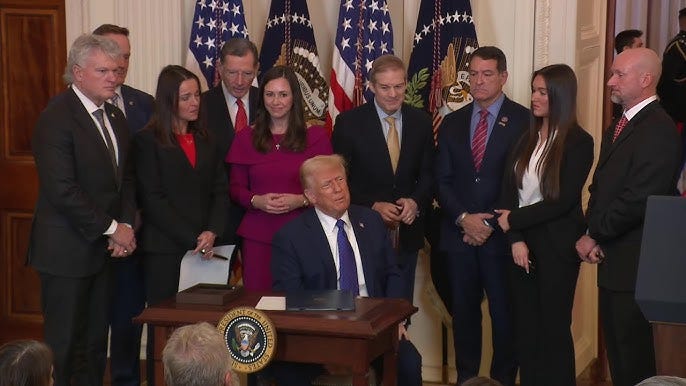Trump Signs the Laken Riley Act Into Law: A Landmark Shift in Immigration Policy
Ending Sanctuary for Criminals
Washington, D.C. – January 29, 2025 – President Donald J. Trump has officially signed the Laken Riley Act into law, a major legislative move aimed at closing immigration loopholes that have allowed dangerous criminals to remain in the United States.
The Act is named after Laken Riley, a 22-year-old nursing student from Georgia who was brutally murdered in February 2024 by José Antonio Ibarra, an illegal immigrant from Venezuela with a history of prior arrests. Riley’s tragic death, which could have been prevented had immigration laws been properly enforced, sparked national outrage and reignited the debate over sanctuary policies that protect illegal criminals from deportation.
What the Laken Riley Act Does
The Laken Riley Act is designed to crack down on criminal illegal aliens by requiring their detention under specific conditions. Here’s what the law mandates:
Mandatory Detention for Criminal Illegal Immigrants – Any illegal immigrant who has been charged with, arrested for, convicted of, or admits to committing burglary, theft, larceny, shoplifting, or assaulting a law enforcement officer must be detained by U.S. Immigration and Customs Enforcement (ICE). No exceptions.
State Attorneys General Can Sue the Federal Government – The law empowers states to take legal action against the federal government if immigration authorities fail to detain or deport illegal aliens who pose a danger to public safety.
Stronger Local-Federal Cooperation – The Act forbids sanctuary cities from ignoring ICE detainer requests, ensuring that criminals don’t get released back into American communities instead of facing deportation.
This law eliminates the dangerous loopholes that have allowed thousands of violent offenders to roam free under the protection of sanctuary city policies.
The Political Battle Over the Act
The Laken Riley Act passed through Congress with significant Republican support and the backing of some moderate Democrats who could not ignore the growing crisis of criminal illegal aliens harming American citizens. The final vote came in at 263-156 in the House and 64-35 in the Senate before reaching President Trump’s desk.
Supporters of the Act argue that it’s a common-sense measure to protect Americans from criminals who should never have been allowed to remain in the country in the first place. “This is about enforcing the law and putting American citizens first,” said Senator Katie Britt (R-AL), who sponsored the bill.
Opponents, including left-wing groups like the ACLU and National Immigration Law Center, claim the law could lead to racial profiling and undermine due process rights. Some sanctuary city officials have already vowed to resist its enforcement, setting the stage for a legal showdown between state and federal authorities.
Why This Matters: A Shift in Immigration Enforcement
The signing of the Laken Riley Act marks a major shift in U.S. immigration policy. Under previous administrations, cities and states were allowed to shield illegal immigrants from deportation—even those arrested for serious crimes.
This law puts an end to that practice. It forces local and state officials to comply with ICE detainers and ensures that criminals do not get a free pass simply because of their immigration status.
The murder of Laken Riley was a preventable tragedy. If the immigration system had worked as it should, her killer would have been deported long before he had the chance to take her life. Instead, he was released thanks to lax enforcement and sanctuary city protections—a failure this law is designed to fix.
President Trump made it clear in his remarks at the signing ceremony:
“No more excuses. No more sanctuary for criminals. This is about justice for Laken Riley and every American who has suffered because of weak immigration laws.”
Final Thoughts
The Laken Riley Act is now law. It ends the era of sanctuary for criminal illegal aliens and prioritizes the safety of American citizens over the interests of open-border radicals.
The battle isn’t over, though. Expect Democrats, activist judges, and sanctuary city mayors to fight this law every step of the way. But the American people have spoken: They want law and order. They want accountability. And they want criminals deported.
This law is a step in that direction. Laken Riley deserved better. So does America.




